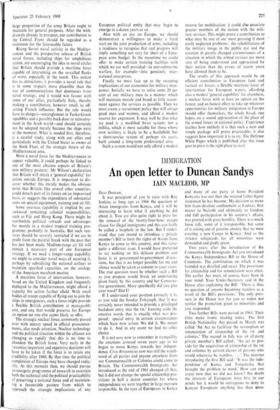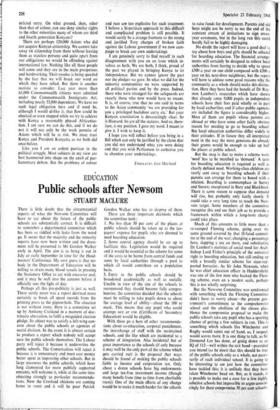IMMIGRATION
An open letter to Duncan Sandys
'AIN MACLEOD, MP
Dear Duncan.
It was percipient of you to raise with Roy Jenkins as long ago as 1966 the question of Asian immigrants from Kenya, and it will be interesting to learn what if anything he did about it. You are also quite right to press for the removal of the twenty-four-hour escape clause for illegal immigrants and this can fairly be called a loophole in the law. But I under- stand that you intend to introduce a private member's Bill to limit the rights of Asians from Kenya to come to this country, and this raises quite a different issue. I would have preferred to say nothing on this delicate problem and leave it to government-to-government discus- sions, but that is no longer possible for me and silence would be taken as consent to your views. The true question must be whether such a Bill as you propose would break an undertaking given freely by this country and her Conserva- tive government. More specifically did you give your word? Did I?
If I understand your position correctly it is, as you told the Sunday Telegraph, that 'it was certainly never intended to provide a privileged backdoor entry into the oc.' Leaving aside the emotive words that is exactly what was pro- posed: special entry in certain circumstances which have now arisen. We did• it. We meant to do it. And in any event we had no other choice.
It is not easy now to remember in tranquillity the emotions aroused seven years ago as we began to move Kenya towards her indepen- dence. Civis Britannicus sum was still the watch- word of all parties and anyone anywhere from our Commonwealth or Colonies could come to Britain. The Commonwealth Immigrants Act introduced at the end of 1961 changed all that, but it did not change the special citizenship pro- visions in half a dozen countries for whose independence we were together in large measure responsible. In the eyes of Europeans in Kenya
and many of our party at home President Kenyatta was not then the revered father-figure statesman he has become. My decision to move him from desolate confinement at Lodwar, first nearer to Nairobi and ultimately to freedom and full participation in his country's affairs, was greeted.with great hostility. There was much loose talk, some of it irresponsible, but some of it arising out of genuine anxiety that we were creating a new Congo in Kenya. And so the strictest safeguards for all minorities were demanded and gladly given.
Two years after the introduction of the Commonwealth Immigrants Act you introduced the Kenya Independence Bill to the House of Commons. The constitution on which it was founded was detailed and exact. The provisions for citizenship and for renunciation were clear. The earlier Act must, of course, have been in your mind. Your Under-Secretary said in the House after explaining the Bill : 'There is thus no question of anyone becoming stateless as a result of the Bill's provisions.' The only pres- sure in the House was for you to widen not restrict the protection given to minorities and you responded.
Two further Bills were passed in 1964. Their titles make ironic reading today. The first British Nationality Act passed in March was called 'An Act to facilitate the resumption or renunciation of citizenship of the UK and colonies.' The second in July was an all-party private member's Bill called : 'An act to pro- vide for the acquisition of citizenship of the Inc and colonies by certain classes of persons who
would otherwise be stateless .' The minister introducing the first Bill said : 'It was the inde- pendence of Kenya and Tanganyika that brought the problem to mind.' How can one argue now that we did not know? No doubt the interests of Europeans were first in our minds but it would be outrageous to deny to Kenyan Europeans anything less than Imre- stricted entry. On what ground, then, other than that of colour, can one deny similar rights to the other minorities many of whom are third and fourth generation Kenyans?
There are perhaps 120,000 Asians who did not acquire Kenyan citizenship. We cannot take away tric citizenship from them without leaving them as stateless persons and quite apart from our obligations we would be offending against international law. Nothing like all these people will come and they are in the main prosperous and hardworking. Their exodus is being speeded by the fear that we will break our word on which they have relied. But there is another statistic to consider. Last year more than 61,000 Commonwealth citizens were admitted under the Commonwealth Immigrants Act, including nearly 53,000 dependents. We have no such legal obligation here and if need be, although I would dislike it, that flow could be checked or even stopped while we try to achieve with Kenya a reasonably phased Africanisa- tion. I am sure we can do this, and if we do not it will not only be the work permits of Asians which will be at risk. We must trust Kenya and President Kenyatta as we both did once before.
Like you I am an ardent partisan in the political struggle. Most subjects in my view are best hammered into shape on the anvil of par- liamentary debate. But the problems of colour and race are too explosive for such treatment. I believe a bi-partisan approach to this difficult and complicated problem is still possible. It would surely be a strange footnote to the strong and justified Tory charges of broken faith against the Labour government if we now cam- paign to break our own undertakings.
I am genuinely sorry to find myself in such disagreement with you on an issue which in- volves us both. We are both, I think, proud of the part we played in bringing Kenya to its independence. But we cannot ignore the past nor the pledges we gave. In what we did for the minority communities we were supported by all political parties and by the press. Indeed, those who were strongest for the safeguards are exactly those who now would have us recant. It is, of course, true that no one said in terms to the Asian community 'we are providing for you a privileged backdoor entry etc.' But your Kenyan constitution is devastatingly clear. So is Hansard. So are all the statutes. And so, there- fore, is my position. I gave my word. I meant to give it. I wish to keep it.
I hope you-will reflect before you bring in a Bill which can only be justified by the claim that you did not understand what you were doing and that you wish Parliament to authorise you to abandon your undertakings.
Yours ever, lain Macleod



































 Previous page
Previous page